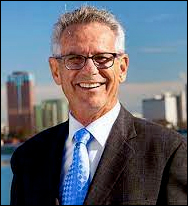By Jim Ellis
Dec. 20, 2021 — California Congressman Alan Lowenthal (D-Long Beach) announced late last week that he will not seek a sixth term in the House next year becoming the 18th Democratic member to either retire or run for another office.Rep. Lowenthal, 80, will have been in elective office for 30 consecutive years at the completion of this term, including his time in the California Senate, State Assembly, and on the Long Beach City Council. Prior to venturing into elective politics, Lowenthal was a college psychology professor at the California State University at Long Beach.
The congressman’s 47th District is a small urban CD that contains parts of Los Angeles and Orange Counties. He represents the cities of Long Beach and Signal Hill in LA County, and Cypress, Westminster, and Garden Grove in Orange County. His district also is home to the Port of Long Beach, which is the largest container terminal in the nation, and is one of the key reasons Lowenthal sits on the Transportation and Infrastructure Committee.
With a second California open seat coming in a period of just over a week — Rep. Devin Nunes (R-Tulare) announced Dec. 6 that he would resign — redistricting strategy could significantly change. The California Citizens Redistricting Commission members are in the process of developing a new congressional map.
California loses a seat in reapportionment, and the population numbers suggest that one of the Los Angeles area seats will be collapsed. Rep. Lowenthal’s district appeared to be one of the prime targets for elimination. The first draft map, however, yields a collapsing of Rep. Karen Bass’ 37th CD in the Culver City area largely because she announced her campaign for mayor of Los Angeles early, thus giving everyone advance notice that she would not be seeking re-election to the House. The Lowenthal retirement coupled with Nunes’ in the Central Valley, however, could change the redistricting strategy.
A total of 18 congressional districts touch Los Angeles County. Nine are fully contained within the county boundaries, while the other nine, such as Rep. Lowenthal’s 47th District, expand into neighboring domains. All 18 require more residents to meet the new state per district population quota of 760,350 individuals. CA-47 needs an additional 45,679 people to reach the resident requirement, making it the 13th highest California CD that requires increased population.
Rep. Bass’ district, one of the nine fully contained within LA County, ranks 17th among the California CDs needing more people, translating to 38,173 bodies.
Rep. Nunes’ 22nd District is in the opposite situation. His seat must shed 27,443 individuals to other places. This suggests the 22nd District will not be eliminated, but the commission members could certainly make it more Democratic. If they choose this course, then it is likely that adjacent Rep. David Valadao’s (R-Hanford) 21st District, that needs to gain 48,213 residents, would become more Republican.
The state’s fourth and, at this point, final open seat, which is retiring Rep. Jackie Speier’s (D-Hillsborough) 14th District just south of San Francisco, needs to gain only 13,729 individuals. The 14th’s geographical positioning in addition to the low number of people it needs to meet the legal population requirement suggests that this CD will largely remain intact.
The Lowenthal retirement brings the number of House incumbents not seeking re-election to 27 and the total open universe to 38. Reapportionment is responsible for seven of the extra open seats, and so far state maps have created an additional four incumbent-less campaign districts. Not included in the 2022 election cycle open number is the FL-20 special election that will be filled on January 11th.

